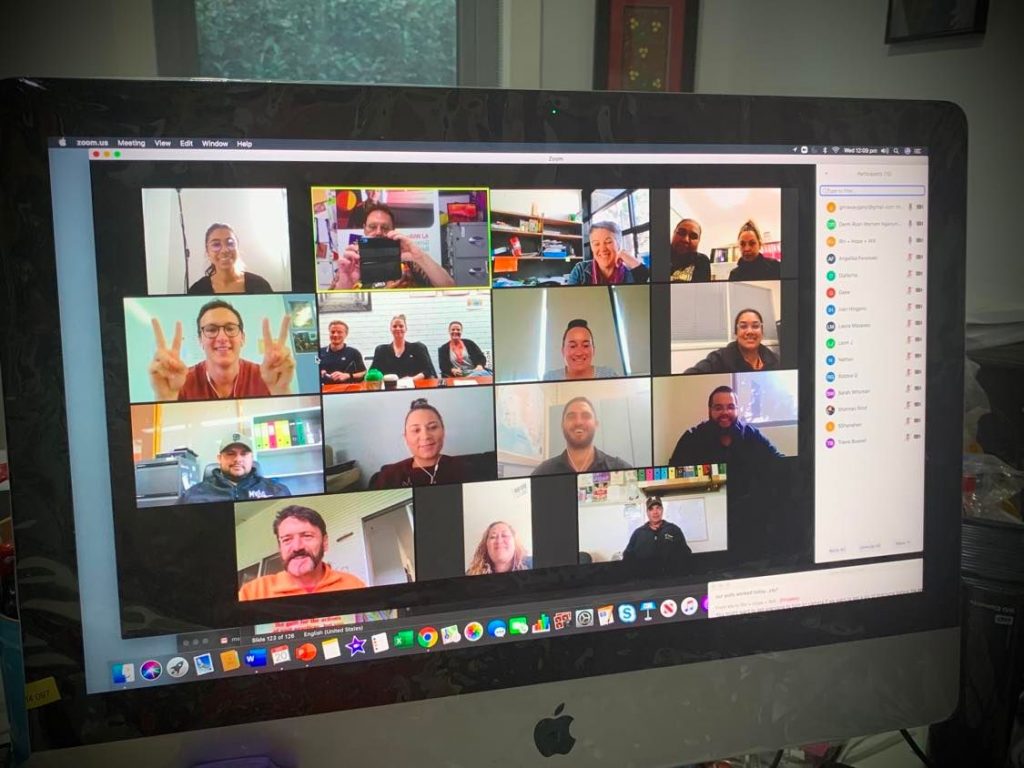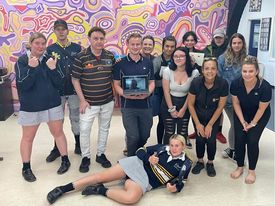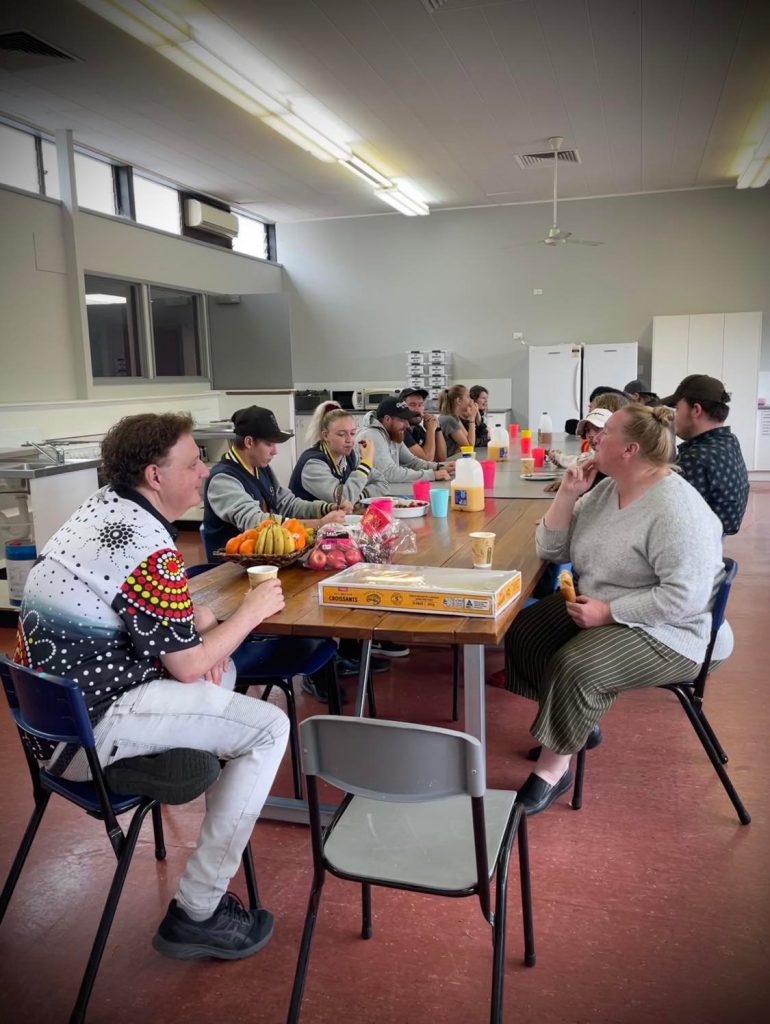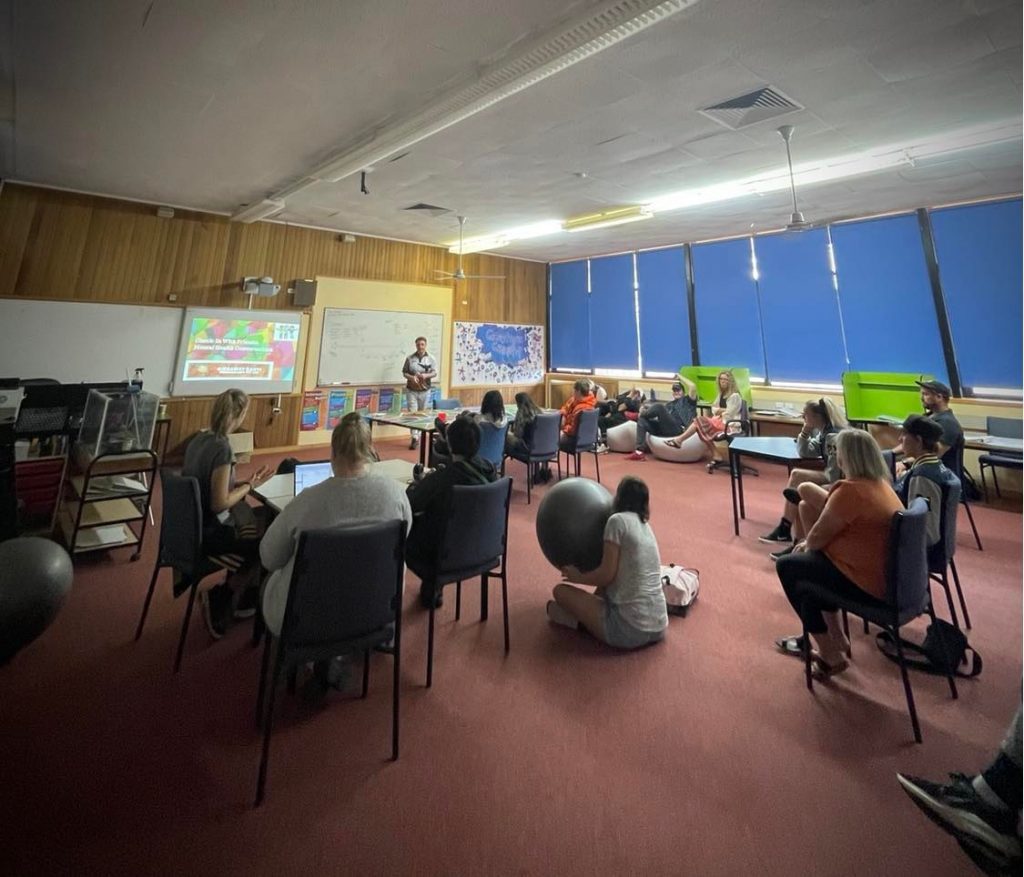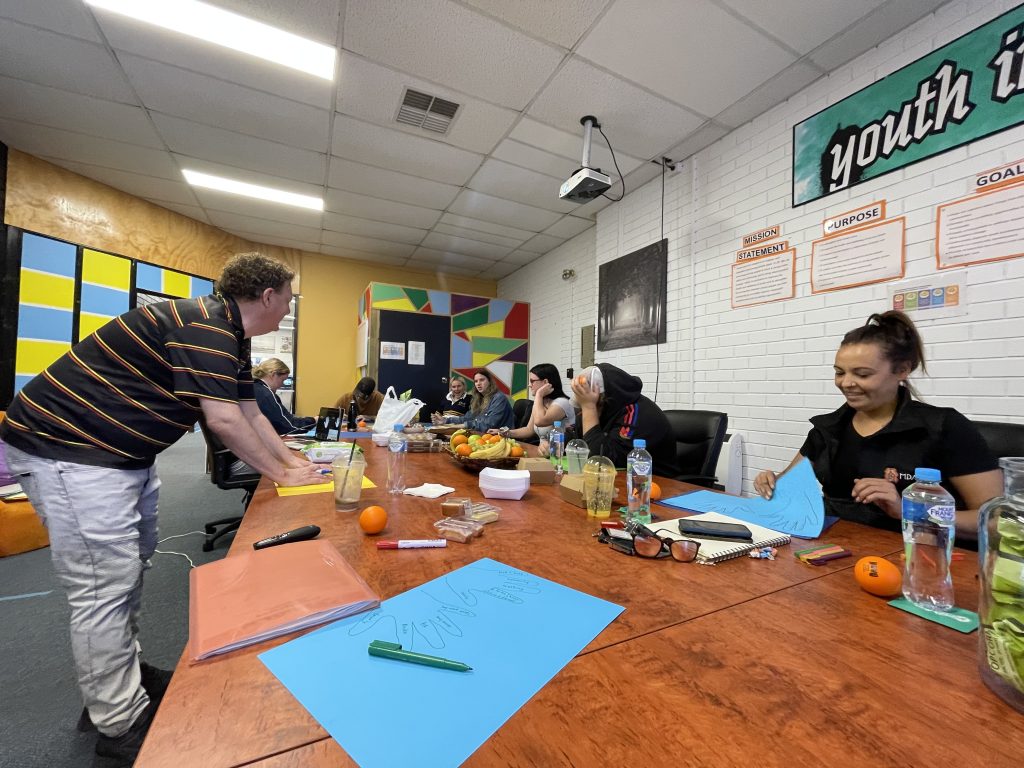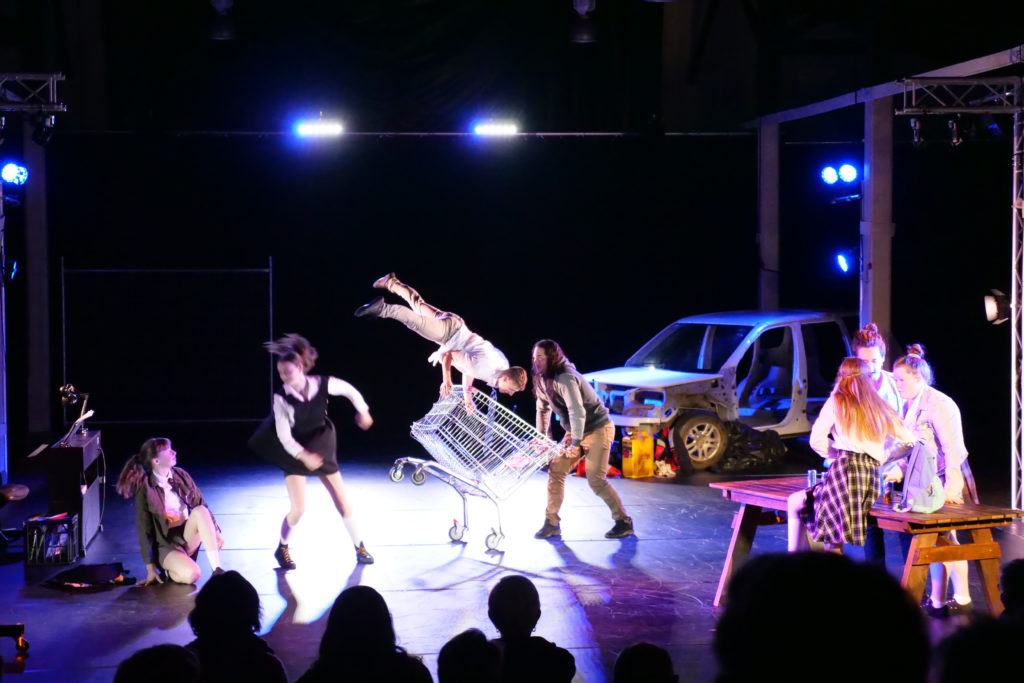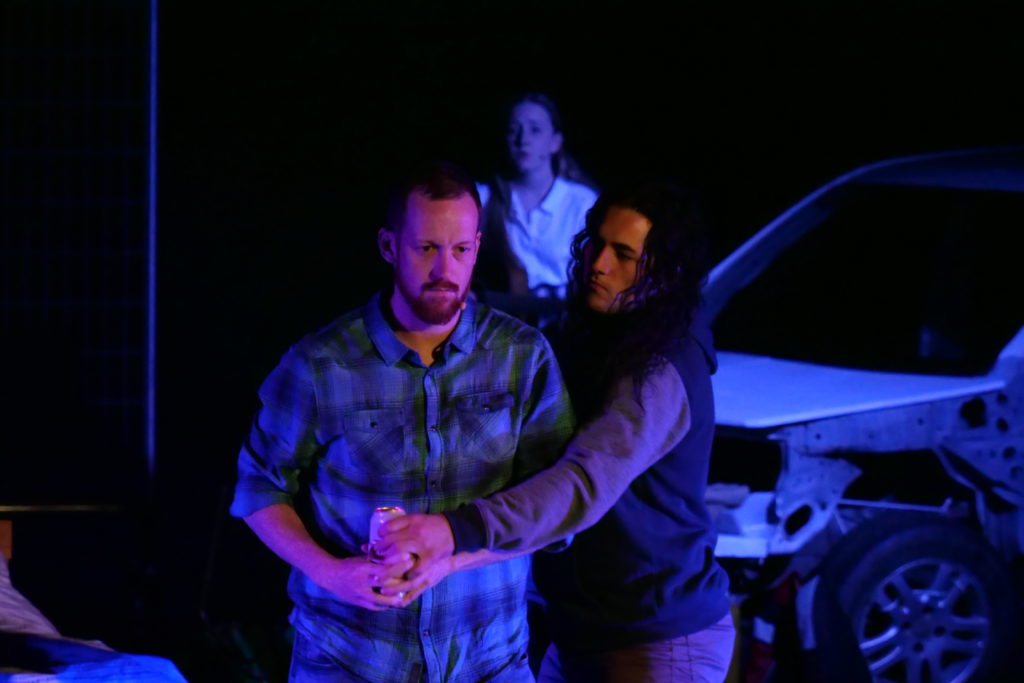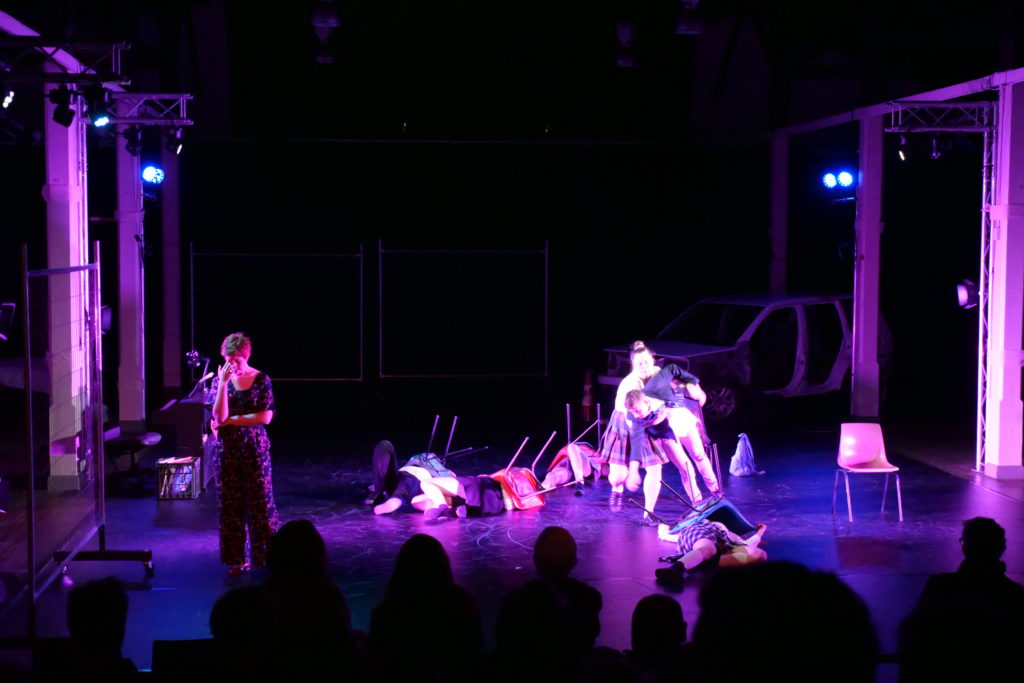Foundation for Rural & Regional Renewal (FRRR)
There are many elderly residents living there in aged care in the Southern Highlands in New South Wales who have limited financial support. In fact, the community-owned Harbison Memorial Retirement Village – which provides up to 50% of their residential places to residents who can’t afford to pay for their care and accommodation – receives no government funding for wellbeing, or capacity building programs.
In 2021, Harbison initiated the Grand Friends Pilot Program, an inter-generational community initiative connecting elderly residents with Kinder to Year 2 students, their families and the wider community. Partway through, the program was suspended due to COVID and a lack of funding. But the Southern Highlands Community Foundation – an organisation fostering local philanthropy to support community needs and initiatives – auspiced a grant application on behalf of Harbison, and received $20,000 through FRRR’s In a Good Place (IAGP) program to complete their pilot.
Through the generous support of CCI Giving, this IAGP grant helped restart Harbison’s pilot program, which concluded in December 2021 following a short suspension. And with benefits for both aged care residents and children alike, the program has now begun to roll out to other local schools.
The weekly program involves Kinder, Year 1 and Year 2 classes hosting their Grand Friends, with everyone participating in structured activities, conversation and a shared morning tea. In between visits, the children write letters, make cards, rock friends and complete activities to prepare for the next Grand Friends visit – Grand Friends become part of the day-to-day discussions and activities in the classroom. Residents reported reduced loneliness and incidences of depression, improved memory, mood, confidence and mobility, and an increased sense of meaning and purpose in their life.. The program also saw evidence that participating children develop empathy, social confidence and language skills.
Harbison resident, Harold Griffin, believes it is a gift to be able to visit his junior class each week.
“I get a thrill out of attending the school visit. The energy and excitement the kids have, created by our group attending their school, is wonderful,“ Harold said.
$200,000 available to fund community-led mental health projects
Remote, rural and regional communities across Australia can apply now for grants through FRRR’s In a Good Place (IAGP) program to support community-driven activities focused on mental health and wellbeing. Offered in partnership with CCI Giving, there is $200,000 available through grants of up to $20,000 for projects that support vulnerable community members at risk of, or experiencing, mental health issues.
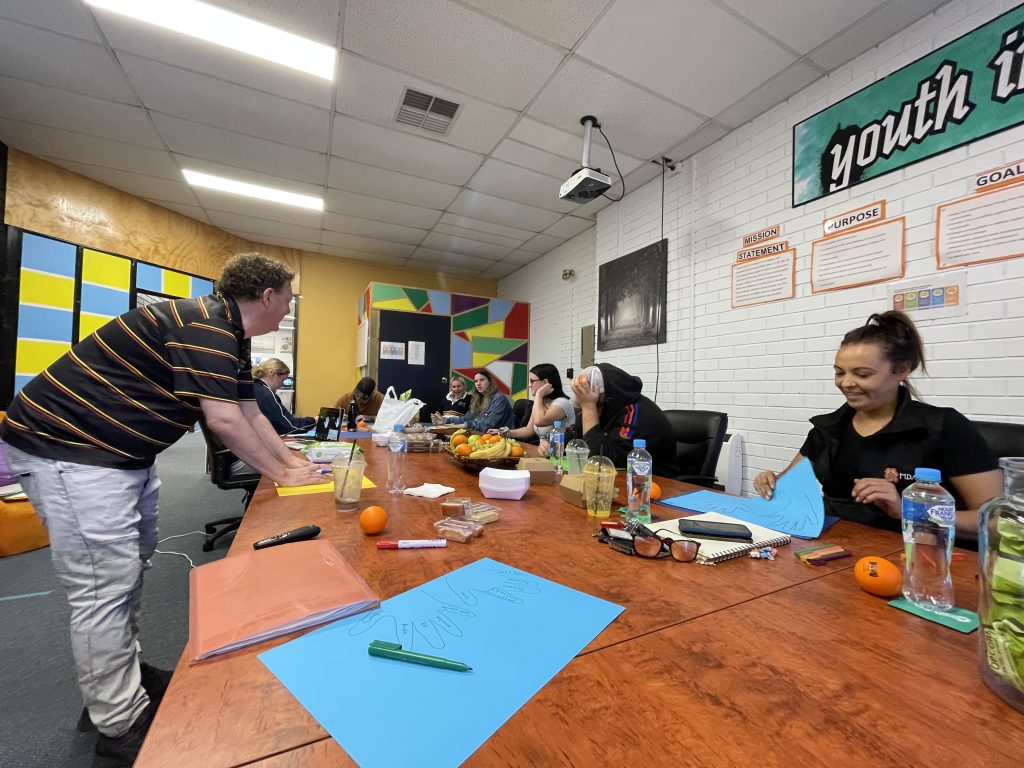
The program supports a range of approaches that are preventative or responsive in nature, and clearly and directly focus on strengthening mental health and wellbeing. These include initiatives that increase social participation and connections with the community, and reduce stigma surrounding mental health by encouraging open discussion and supporting self-help-seeking.
Jeremy Yipp, CCI Chief Risk Officer and Chair of CCI Giving, said that greater access to mental health services and support is vital to those living in rural communities, particularly following times of crisis.
“Rural and remote communities continue to be affected by events such as fires and flooding, and in recent years the pandemic. It’s more important than ever to encourage people to stay connected and seek support, especially for those living in places with limited access to mental health services.
“Our partnership with FRRR helps CCI Giving reach remote, rural and regional communities, to build and nurture social connections and community participation, and provide access to mental health training and education,” said Mr Yipp.
Jill Karena, FRRR’s People Programs Portfolio Lead, said that the events of the past few years have highlighted the need for rural Australia to have equitable access to mental health services and support.
“The impact of the pandemic, and the subsequent isolation, is still being felt and understood. But clearly, access to mental health tools, services and support that are driven by community need, are critical to improving and strengthening the mental health of remote, rural and regional Australians, particularly younger members of the community.
“As an example, through the IAGP program, the Youth Affairs Council Victoria (YACVic) in Swan Hill received funding of $13,480 to deliver a culturally specific Mental Health First Aid (MHFA) training program and establish a local support network – Deadly Yarning & Learning, targeting Aboriginal and Torres Strait Islander young people.
“Although initially intended to be delivered face-to-face, the COVID pandemic and lockdowns caused serious disruptions to the project. Instead, most training took place online. Aboriginal and Torres Strait Islander young people gained vital skills in MHFA, connected with each other, relevant workers and service providers, and increased their confidence and leadership skills while helping to shape local, culturally safe responses to mental health.
“Our partnership with CCI Giving means we can support these kinds of community-led approaches to mental health services that respond to community need and are accessible for people in rural areas who may otherwise have difficulty accessing services,” Ms Karena said.
Applications open on 20 April 2022. As in previous years, FRRR expects this will be a highly competitive program and so there is a two-stage application process. A brief Expression of Interest must be submitted no later than 5pm AEST, Wednesday 25 May 2022. The Expression of Interest form and more information is available on FRRR’s website – https://frrr.org.au/funding/place/in-a-good-place/. Applicants can also call 1800 170 020.
The IAGP program is the centrepiece of a partnership between FRRR and CCI Giving which has just been extended for a further five years, to run until 2027. Since the partnership began in 2018, IAGP has awarded $800,000 in grants to 53 community-led initiatives that promote good mental health and wellbeing in remote, rural and regional communities.
$1.25m in grants to be made available
The Foundation for Rural & Regional Renewal (FRRR) and CCI Giving have agreed to a five-year extension to their partnership and national grants program, In a Good Place (IAGP). This means that the grant program will now run until at least 2027.
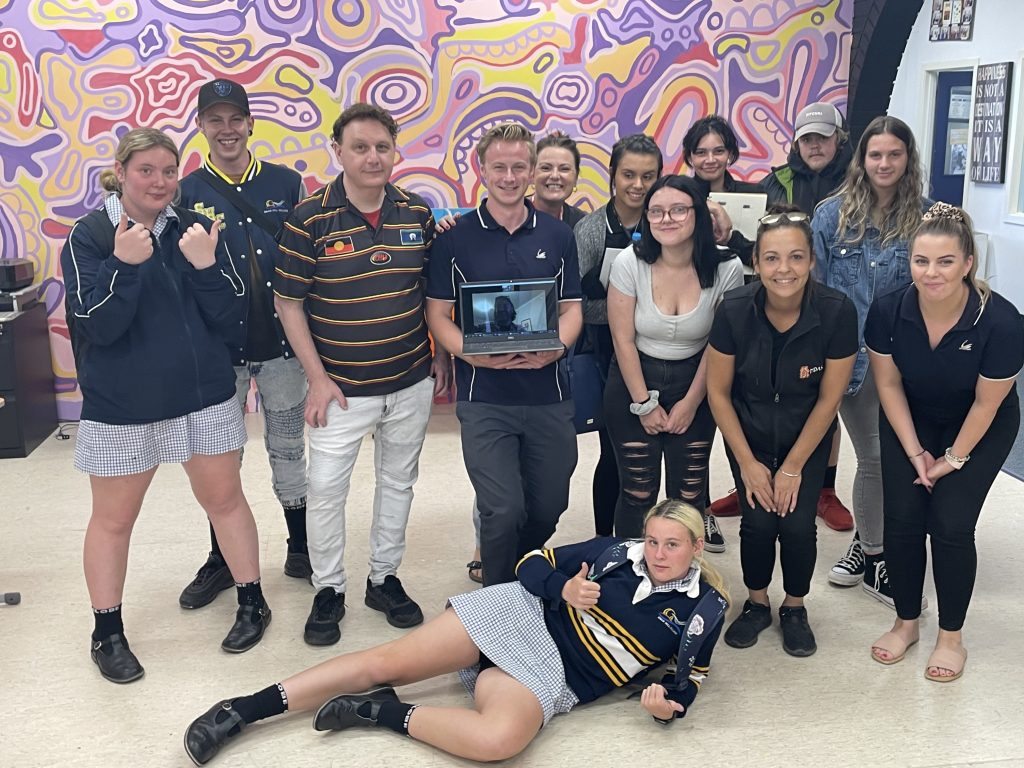
CCI Giving has also made a commitment to increase the funding available each year by $50,000, meaning that there will be $250,000 available to applicants annually, starting next year.
The partnership between CCI Giving and FRRR began in May 2018 and, since then, $800,000 in grants have been awarded to 53 projects across remote, rural and regional Australia through the IAGP program.
This program strengthens mental health in rural communities by supporting locally-led initiatives that reduce social isolation, increase social participation and connectedness and encourage people to seek help in tackling mental health challenges.
Jeremy Yipp, CCI General Manager, General Insurance Claims and Chair of CCI Giving, said that they are committed to providing rural Australians with greater access to mental health care.
“There are many stressors when it comes to mental health and, sadly, the pandemic has exacerbated these, particularly among young people living in rural areas who don’t have the same access to mental health services as those living in cities.
“There are key groups working on the ground, at the local level, who we want to ensure have the support to implement initiatives that they know will make a difference.
“We are always stronger when we work with others, and we are delighted to be extending our relationship with FRRR. I know that working closely with FRRR is vital to the impact and effort of the many organisations who are supporting communities and people who are at risk of mental ill health. Five years and additional funds is something to really celebrate,” said Mr Yipp.
Natalie Egleton, CEO of FRRR, said that this commitment from CCI Giving provides much-needed certainty to rural Australia.
“Historically, remote, rural and regional communities across Australia haven’t had the equity of access to the mental health and wellbeing resources that they need. With the added pressure of the challenges that these communities have faced in recent years, access to these kinds of services is now more crucial than ever before.
“Our Heartbeat of Rural Australia survey showed that as a result of consecutive natural disasters and the pandemic, there has been lowered resilience, increased fatigue and stress, and high levels of mental health illnesses in rural communities. CCI Giving’s commitment of increased grant funds and the certainty of it being on offer for the next five years, provides these communities with security and greater access to funding for community mental health projects that can have a profound impact for those involved.
“At FRRR, we have loved working alongside CCI Giving, providing support and tools to these vital, community-led initiatives. We couldn’t be more delighted to announce the five-year extension of our work together,” Ms Egleton said.
The next round of IAGP grant applications will open 20 April 2022. To find out more about this program go to https://frrr.org.au/funding/place/in-a-good-place.
Youth mental health is an issue that many organisations and communities across the country work hard to improve. Raising awareness through conversation and proper guidance is crucial to improving and strengthening the mental health of young Australians. In the northwest of Victoria, you’ll find the city of Swan Hill where Youth Affairs Council Victoria (YACVic) are doing just that. As the leading advocate for young people aged 12-25 in Victoria, they work closely with young Victorians and the sector to support them and deliver effective advocacy.
Over the past two years, YACVic have hosted the ‘Turning Ideas into Action’ and ‘What Matters’ youth forums across Victoria. Through these forums, young people have identified mental health as a major priority. A report conducted in 2010 (Working Together: Aboriginal and Torres Strait Islander Mental Health and Wellbeing Principles and Practice) identified young Aboriginal people are at increased risk of experiencing mental illness and are also less likely to engage with mainstream youth mental health services. To improve this situation, YACVic wanted to create a space that would be culturally safe and relevant for Aboriginal and Torres Strait Islander youth.
YACVic sought funding to deliver culturally specific Mental Health First Aid (MHFA) training program – Deadly Yarning & Learning. The training session would target 20 Aboriginal and Torres Strait Islander young people and then ten additional people to work with them on a regular basis as mentors in Swan Hill and Robinvale. The training would be provided by AJ Williams-tchen from Girraway Ganyi to make sure that both the content and delivery is done in a competent and safe manner.
Using a $13,480 In a Good Place (IAGP) grant, supported by CCI Giving, YACVic would partner with local services in the area including Mallee District Aboriginal Services and Robinvale Secondary College to provide the training over two days in each location. The following six months would then involve regular monthly community of practice sessions for the 20 participants to discuss how they have been able to put into practice their training since the initial sessions. The catch ups would also be used as a safe space for debriefing and continued peer learning and development, but also as a way to identify any key issues that had arisen in the community.
After having one training session in each location, YACVic were required to quickly adapt the original plan, with the COVID pandemic and lockdowns causing serious disruptions to the project. To ensure the safety of everyone involved, YACVic decided to postpone the face-to-face youth training component of the project until restrictions eased. They were, however, able to take the mentor training online, which proved to be quite beneficial as they were able to bring five more people on as mentors.
By undertaking the training and participating in the monthly community of practice sessions, Aboriginal and Torres Strait Islander young people will gain skills in MHFA, connect with each other, relevant workers and service providers and increase their confidence and leadership skills while helping to shape local, culturally safe responses to mental health.
Mental Health training helps community get in a good place
With the effects of plunging milk prices and bushfires in South West Victoria, the community was feeling strained. Front line workers were regularly being confronted with people breaking down because they couldn’t pay their bills, afford feed for their stock or feeling financial pressure.
The Simpson & District Community Centre (SDCC) knew it was important to keep the conversation about mental health in the community open, to continue to break down the stigma associated with asking for help. So, they wanted to equip local community members with the skills to recognise mental health issues and provide resources for referrals to support services, as well as give them skills in self-care, given they were dealing with more and more people in crisis.
SDCC was established almost four decades ago to support Western Victorian dairying communities. Around 50 people a week use its facilities for meetings and activities – from craft, scrabble days, children’s activities, adult education, digital literacy, a Men’s Shed programme and more. The centre puts considerable effort into reducing social isolation and increasing health and wellbeing in the area.
The Simpson area has been supported by a Dairy Community Support Officer who works with farming community families in crisis. In three years, the social worker’s client numbers went from 9 to 98. She identified a number of mental health issues facing the community including anxiety, depression, drug and alcohol abuse and self-imposed isolation. The community has had one suicide since the beginning of the dairy crisis and wanted to do whatever was needed to prevent more.
Through the In a Good Place Program, funded by CCI Giving, FRRR was able to help fund the delivery the training. In March 2019, nine community members participated in a two-day Mental Health First Aid course. Another session ran in March 2020, with a half day refresher for the previous years’ participants.
In total, 16 members of the community were provided with the training and skills to identify and start a conversation regarding mental health. Those trained included workers from the local supermarket and Post Office, stockfeed supplier and vet group, as well as dairy farmers and volunteers from the Football Netball Club, Men’s Shed, Community Centre, Cricket Club, CFA and Landcare network. The array of participants meant that there was great community coverage, with everyone attending wearing “more than one hat” – so those new skills are going into nearly every organisation and workplace in Simpson.
Furthermore, the instructor for the First Aid program and the Dairy Community Support Officer were able to identify an opportunity to secure funding for additional training that will reach the community, regarding Mental Health in the elderly population. Transitioning off farms for older people is an area of mental health difficulty that the Support Officer sees first hand in her work in the community.
The SDCC maintains that if just one person can be supported through a crisis without a tragedy, then the program will be a success.
“Training more people in the community to recognise the signs and direct them to help or help to them can only improve the long term outcomes for our community and increase the resilience and sense of connection.
“By providing the training we are giving people the skills to take back into the community at their workplaces, homes and recreation activities. The more people who are able to recognise and respond to the signs of deteriorating mental health the stronger our community will be. These skills will be maintained for life and can be shared.”
SDCC Final Report
Congratulations to the SDCC for the great strength and support they provide and their ability to adapt to the community’s changing needs.
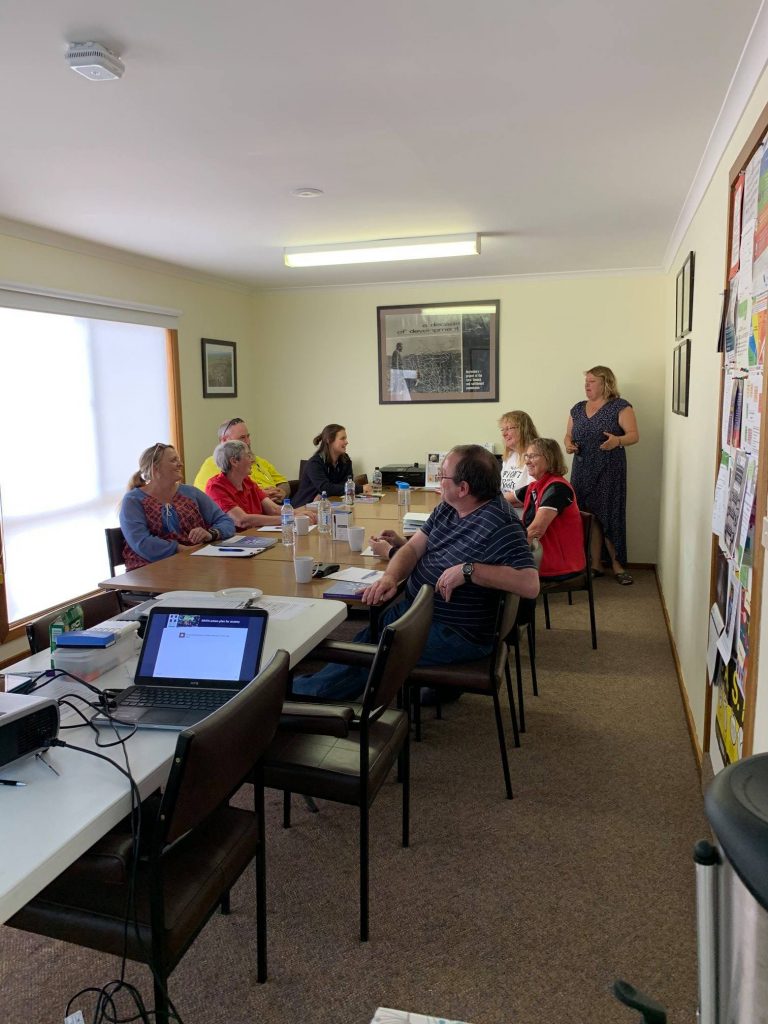
In Coorow, WA, a rural town 270 km north of Perth, the community had been shaken by a series of tragic mental health incidents.
The township has a population of just 200 and is the business and social hub for many small surrounding localities in an area dominated by farming. The agriculture industry in WA’s mid-west is changing, with businesses amalgamating so that the family farm is now often part of a larger enterprise. Businesses rely more on casual workers, reducing the local population and increasing isolation, due to greater distances between farming families.
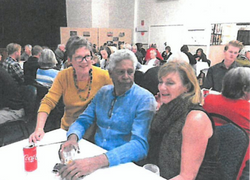
Coorow Community Resource Centre (CCRC) is a local organisation providing professional services to the community, and they clearly saw the need for more informal, activity-based gatherings to support the local community thorough a challenging time.
The In a Good Place program was the perfect fit to support this group in their aims. They successfully applied for a grant of $10,350, funded by CCI Giving, and got to work planning a series of motivational community dinners to encourage the Coorow community to come together for shared learning and social interaction.
The FRRR grant enabled the group to engage guests speakers for the ‘On Speaking Terms’ event – ordinarily the high cost of travel would reduce access to such talent, and guest speakers Peter Rowsthorn, Ernie Dingo and Karl O’Callaghan were a special drawcard to get the community together. The events were held at the Coorow District Hall in March, July and October 2019, on dates that worked within the local farming activities timetable for the people of the Shire of Coorow and surrounding shires of Perenjori, Carnamah and Moora.
Each event in the series also included presentations from mental health services in the region such as Wheatbelt Mens Health, Midwest Health service and the Desert Blue organisation. Dinners were catered by the CCRC and four school students from the area volunteered as wait staff. A ‘goodie bag’ was given to attendees to take away, including a Health Services in the area booklet compiled by the CCRC. The evenings were advertised and reported on by local newsletter, the Coorow Magpie Squawk.
Deborah Maley, Coordinater at CCRC said, “The Coorow CRC achieved everything we set out to with this program. We delivered three evenings with high profile speakers and had an amazing attendance to each and every one.
“Each speaker had a different way of putting forward their message and this meant that everyone could relate in different ways. All speakers created conversations within the attendees and also with the community as a whole.”
The group expected they might get 100 attendees to the event, but their smart plan enticed 224 people to attend the series, a remarkable outcome for a town of just 200 people. They have since reported that health agencies represented at the dinners have been contacted by community members following the info sessions, so they are hopeful that the message is reaching some of those local people that will benefit from mental health support.
FRRR has awarded $200,000 to 11 locally-led community initiatives that will provide mental health and wellbeing support for remote, rural and regional communities.
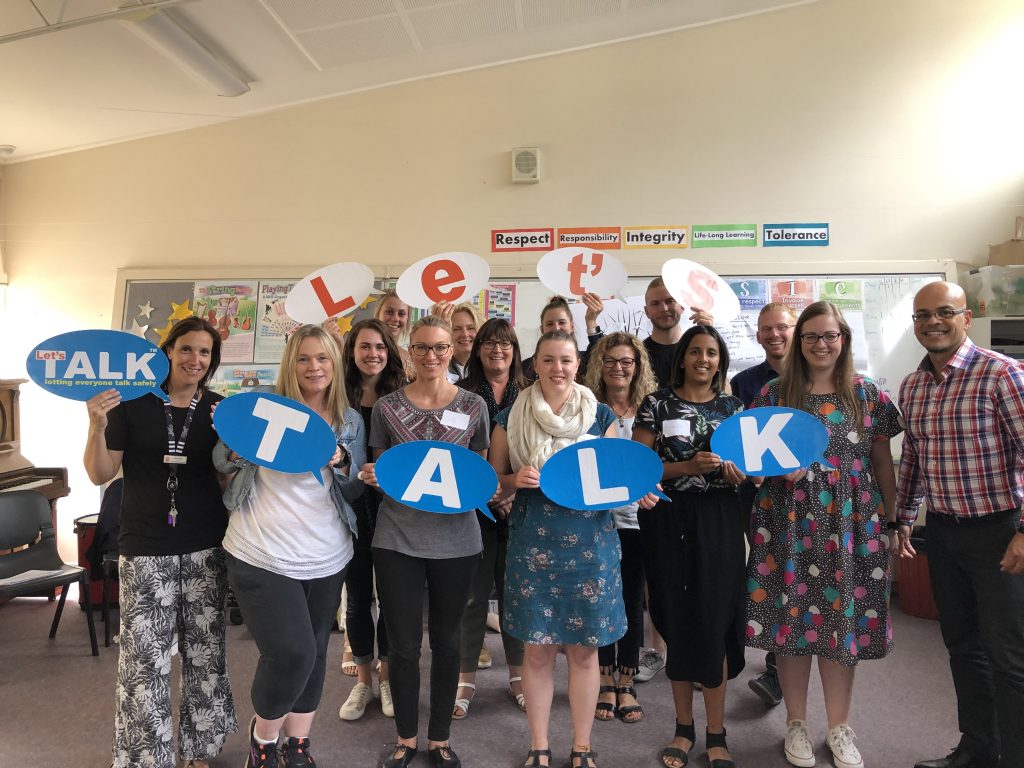
Funded through the In a Good Place (IAGP) program, these grants provide support for community-driven initiatives that reduce social isolation, increase social participation and encourage people in remote, rural and regional communities who are at risk of, or are experiencing, mental health issues to seek help. The national grant program, now in its fifth year, is funded by CCI Giving, the charitable foundation of Catholic Church Insurance (CCI).
This year, the IAGP grants awarded range from $12,000 to help local businesses and their employees in Kingaroy, QLD to support and improve mental health and wellbeing through a series of workshops, through to $20,000 to provide immediate, person-centred, and compassionate care for community members experiencing mental distress by establishing a peer-staffed, community drop-in centre in Castlemaine, VIC.
Natalie Egleton, CEO of FRRR, said it’s critical to offer this program, as many rural communities across Australia don’t have access to the level of resources that they need when it comes to mental health and wellbeing support.
“Many rural people rely on a sense of strong community to get through the difficult times. But, after a year and half of COVID-19 restrictions, the events and activities that would usually be a way for people to connect and heal, haven’t been able to go ahead. So, many people are feeling increasingly disconnected and socially isolated,” Ms Egleton explained.
“On top of the cumulative impact of natural disasters like drought, fires, flood and cyclones, this has meant that many rural Australians now have an even greater need for both preventative mental health measures, as well as non-clinical support for mental health and wellbeing issues. It also means that communities have had to think outside of the box and find new ways of helping people to connect and care for their mental health.
“That’s why it’s really encouraging to see so many innovative, community-led initiatives that are geared towards helping people in remote, rural and regional communities gain better access to the mental health support that they need.
“We’re grateful to be able to partner with CCI Giving to support these local projects, which we know will really make a difference,” said Ms Egleton.
Jeremy Yipp, CCI General Manager, General Insurance Claims and Chair of CCI Giving, said that improving rural Australia’s access to mental health resources is crucial.
“The In a Good Place program provides important support that is now, more than ever, vital for the mental wellbeing of rural Australia. We are pleased that through our partnership with FRRR we are able to provide funding for these community-led initiatives designed to support and connect the community to the tools they need to care for their mental health and wellbeing,” Mr Yipp said.
Some of the 11 mental health initiatives funded include:
- Wesley Mission Queensland – Murgon and Cherbourg, QLD – Marcus Mission – Building Suicide Prevention Community Capacity in South Burnett – $18,619 – Boost the community’s ability to support vulnerable males by training and supporting local men to deliver the Marcus Mission suicide prevention initiative.
- Pro Patria Centre Ltd Ashmont, NSW – Kitchen Garden to Plate: Nutrition for the Mind, Body, and Soul – $17,160 – Support the mental health and social connection of veterans, first responders and their families by developing a kitchen garden to support future therapeutic gardening and nutrition programs.
- Quorn Community Sporting Assoc Inc – Quorn, SA – Don’t Wait til You’re Stuffed! – $13,900 – Encourage people to come together and boost community resilience by bringing in a guest speaker to share vital tips and advice.
- Dignity Supported Community Garden – Nubeena and Dodges Ferry, TAS – DIGnity Supported Gardening Sessions – $19,440 – Improve social participation and support mental wellbeing of vulnerable community members by providing expert mental health counselling and Occupational Therapist support to participate in therapeutic horticulture sessions.
- Healesville Primary School Healesville, VIC – Let’sTALK Program at Healesville Primary School – $20,000 – Empower staff, students and families to feel safe to talk openly about their mental wellbeing and provide skills to encourage and support help seeking behaviours through a shared program of learning.
To support grants like this through FRRR, make a tax-deductible donation at https://frrr.org.au/giving/.
The full list of grant recipients and their projects are below:
| Organisation | Project | Location | Grant |
|---|---|---|---|
| Castlemaine Community House Inc | Castlemaine Safe Space Support community members experiencing mental distress by establishing a peer-staffed, community drop-in centre by providing immediate, person-centred, and compassionate care in a non-clinical setting. | Castlemaine, VIC | $20,000 |
| Central West Family Support Group Inc | In a Good Place Build mental health awareness in the community to reduce stigma and improve mental health and wellbeing | Condobolin / Lake Cargelligo / Murrin Bridge, NSW | $20,000 |
| Circular Head RSL Sub Branch Inc | Canines Fostering Community Connections - Improving Veteran Well-being in Rural Tasmanian Communities Improve the social participation and mental health of veterans by supporting their pairing with and training of Assistance Dogs. | Smithton, TAS | $19,613 |
| Dignity Supported Community Garden | DIGnity Supported Gardening Sessions Improve social participation and support mental wellbeing of vulnerable community members by proving expert mental health counselling and Occupational Therapist support to participate in therapeutic horticulture sessions. | Nubeena / Dodges Ferry, TAS | $19,440 |
| Healesville Primary School | Let'sTALK Program at Healesville Primary School Empower staff, students and families to feel safe to talk openly about their mental wellbeing and provide skills to encourage and support help seeking behaviours through a shared program of learning . | Healesville, VIC | $20,000 |
| Kingaroy Chamber of Commerce & Industry Inc | SHINE - Supporting Mental Wellbeing through Information, Leadership and Education - Stage 2 Boost and strengthen community resilience by running workshops to help local businesses and their employees support and improve mental health and wellbeing. | Kingaroy, QLD | $12,000 |
| Pro Patria Centre Ltd | Kitchen Garden to Plate: Nutrition for the Mind, Body, and Soul Support the mental health and social connection of veterans, first responders and their families by developing a kitchen garden to support future therapeutic gardening and nutrition programs. | Ashmont (Wagga Wagga), NSW | $17,160 |
| Quorn Community Sporting Assoc Inc | Don't Wait til You're Stuffed! Encourage people to come together and boost community resilience by bringing in a guest speaker to share vital tips and advice. | Quorn, SA | $13,900 |
| Southern Yorke Peninsula Community | Youth on Yorkes Help local youth-focussed organisations to understand and support young people to develop mental fitness and resilience through the employment of a dedicated youth worker. | Yorketown, SA | $20,000 |
| The Southern Highlands Foundation | Grand Friends Foster friendships and increase social connection by bringing together residents from the local aged care facility with primary school children for shared activities. | Bowral / Moss Vale, NSW | $19,268 |
| Wesley Mission Queensland | Marcus Mission - Building Suicide Prevention Community Capacity in South Burnett Boost the community’s ability to support vulnerable males by training and supporting local men to deliver the Marcus Mission suicide prevention initiative. | Murgon / Cherbourg, QLD | $18,619 |
$200,000 available to fund community-led mental health initiatives
FRRR, in partnership with CCI Giving, is once again offering grants to support grassroots initiatives that improve and strengthen the mental health of communities in remote, rural and regional Australia, through the In a Good Place (IAGP) program.
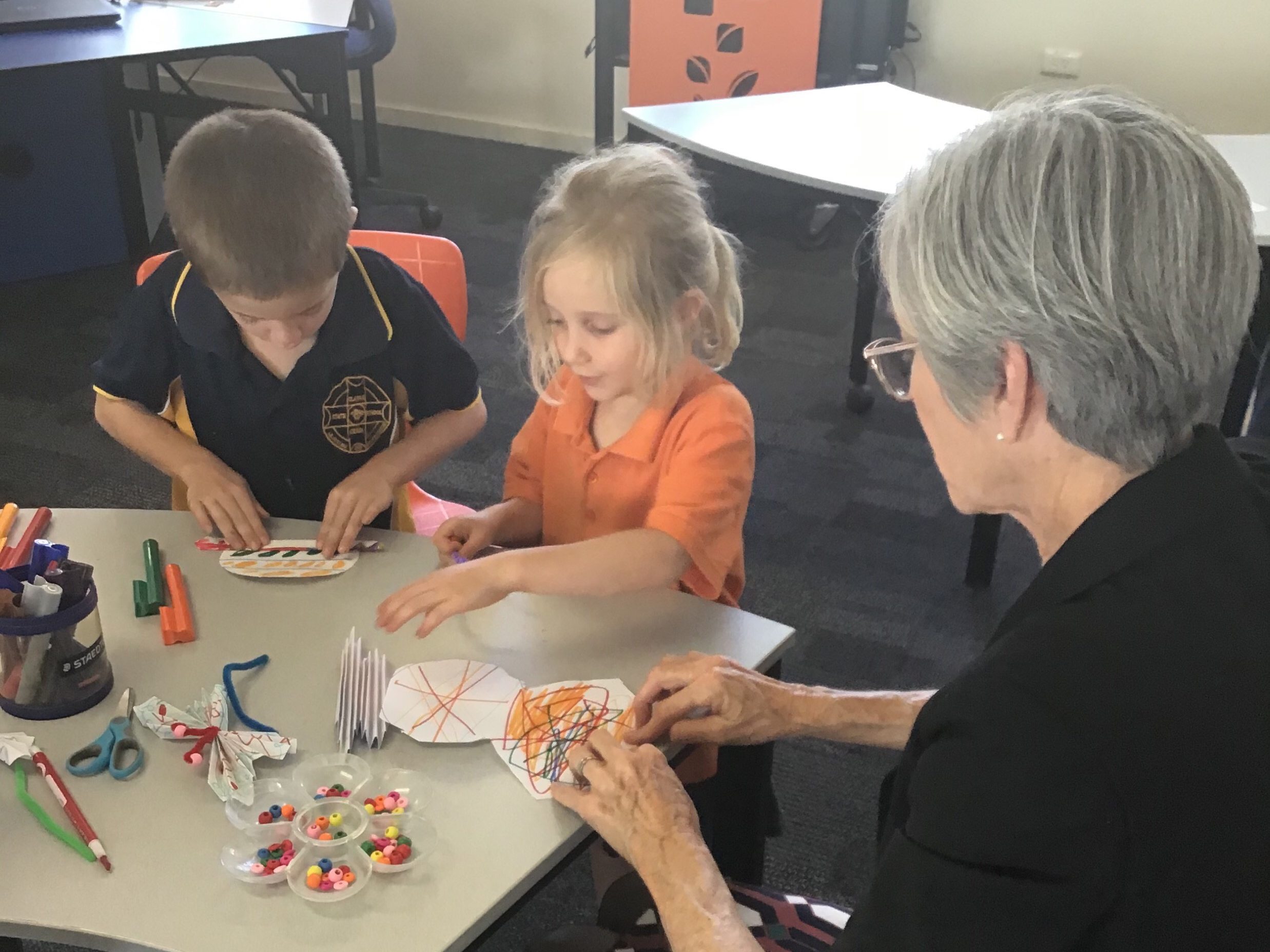
The IAGP program, now in its fourth year, is the centrepiece of a five-year partnership between FRRR and CCI Giving. To date, IAGP has awarded $600,000 in grants to 42 community-led projects that foster good mental health and wellbeing in remote, rural and regional communities.
This year, $200,000 is available, with grants up to $20,000, for projects to ensure that communities have access to mental health services and support; to build and nurture social connections and community participation; and provide access to mental health training and education.
Jeremy Yipp, General Manager, General Insurance Claims at CCI and Chair of CCI Giving, said social connectedness is so important for the mental wellbeing of those living in rural communities, particularly during times of crisis.
“In the last three years, the In a Good Place program has funded a range of community-led projects that have encouraged people to stay connected, seek help and feel supported, especially in rural areas recovering from events such as drought, flooding and now COVID-19.
“Like CCI Giving, FRRR shares our belief in the value and importance of remote, rural and regional communities and recognises that maintaining good mental health is a multi-faceted and lifelong process, requiring a range of approaches to accommodate for different needs and priorities – like responding to an unprecedented event,” said Mr Yipp.
Natalie Egleton, FRRR’s CEO, said that COVID-19 has amplified the need for equitable access to services and trained support in rural Australia.
“As the impact of the pandemic on people’s mental health and wellbeing continues to evolve, it’s more important than ever that those living in remote, rural and regional Australia have access to mental health services, tools and support,” Ms Egleton said.
These tools include mental health training and education, which can then go on to ensure greater access to critical services and professional support.
“One of the very first grants funded through this program was led by Lifeline Tasmania’s Suicide Bereavement Support Group. Their project expanded its program outside of Hobart and into four rural Tasmanian communities that had been identified as having heightened risk of impacts from suicide deaths in the community,” Ms Egleton explained.
“Through the project, locals were empowered to provide access to mental health support in their own community and were given training and resources to increase community understanding and knowledge of suicide postvention.
“Our partnership with CCI Giving means that we can support these kinds of community-based, non-clinical mental health approaches, which we know are more approachable for people in rural areas who may be unwilling to seek help due to a culture of self-reliance, and fear of the stigma associated with asking for help,” Ms Egleton said.
FRRR expects this will be a highly competitive program and so there is a two-stage application process. A brief Expression of Interest must be submitted no later than 8 June 2021. The Expression of Interest form and more information is available here. Applicants can also call 1800 170 020.
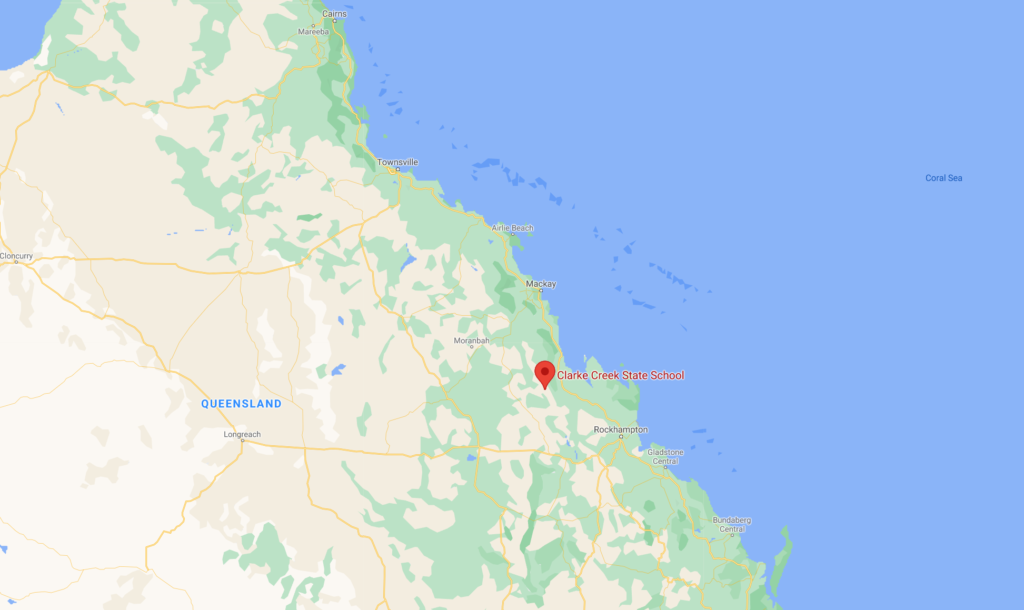
In the remote locality of Clarke Creek in Queensland’s Isaac Region, a community of 320 people have been doing it tough in recent years. In March 2017 Tropical Cyclone Debbie and flash flooding devastated the area, and then came the drought.
People from Clarke Creek mostly own or work on cattle stations, many run by extended and intergenerational family groups. School-aged children in the area were exposed to many impacts of Cyclone Debbie – from damage to community and family infrastructure, livestock and pet animal losses, to financial strain putting pressure on their families.
A problem-solving school
The saving grace of this community is the Clarke Creek State School (CCSS), which, in the absence of a township, serves as the community hub. It caters to the needs of 17 students from Kinder to Year 6, extends support to siblings, parents and extended families of those students, and provides a meeting place for all groups in the area, including the P&C Association.
The Clarke Creek P&C Association knew it was critical to support children through all this, and that school can help facilitate healing by providing the sense of normality that’s needed after a disaster. Since residents of Clarke Creek had to travel up to 230kms to access health and professional services, the P&C Association knew that, for help to be constructive, it would need to be brought into Clarke Creek.
The school had previously gained the services of a chaplain directly though the National Schools Chaplaincy Program, however the school could only afford one visit per fortnight without outside funding. By late 2018, it was clear that there was a need for ongoing disaster support for families. With so many pressures affecting the ability to fundraise locally in the tiny community, the P&C Association applied to FRRR’s In a Good Place program. A grant of $10,000 funded by CCI Giving essentially doubled the chaplain’s visits to weekly from July 2019 until March 2020, when the Department of Education funding applications opened.
Chaplaincy support proves vital
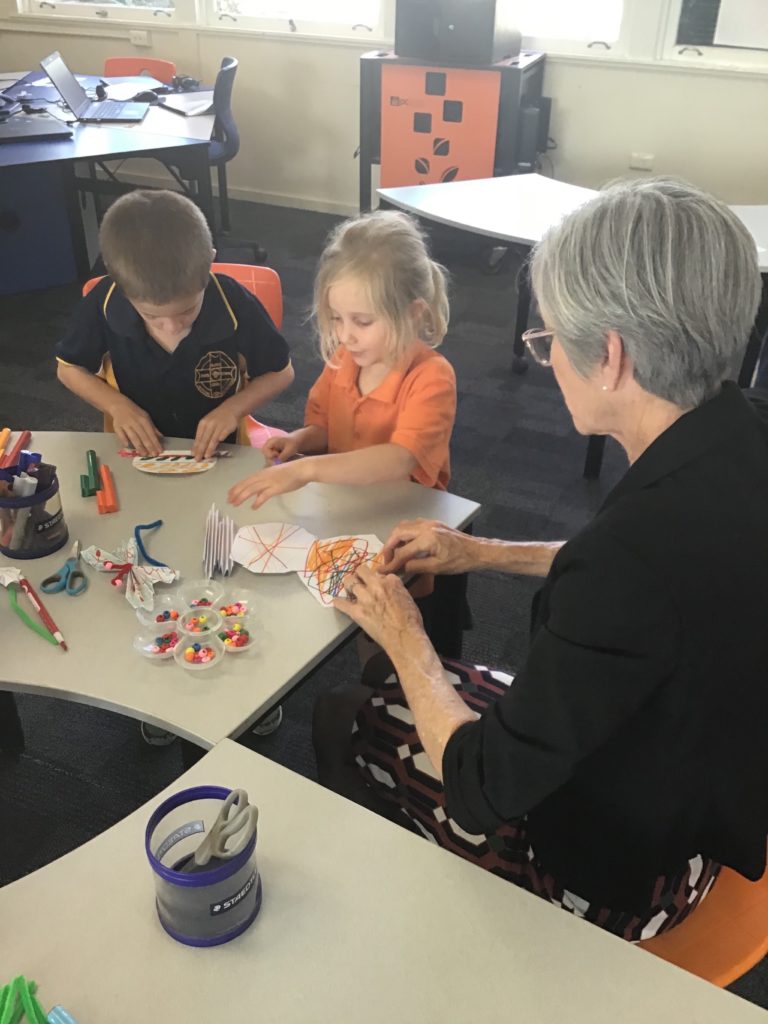
In small schools, the school chaplain is often the welfare provider, and plays a key part of the school support team.
The chaplaincy support at CCSS started shortly after the school and community were devastated by cyclone Debbie, and proved to be highly valuable to students, staff and the broader community, in their ongoing recovery and general mental health and wellbeing. The chaplain attends the school one day each week, working with the children in groups and one on one sessions. She provides emotional support and fosters leadership and kindness in the classroom, playground, and at school events.
“Chappy’, as she is fondly nicknamed, has been imparting those crucial life skills to the children and helping them to deal with the many challenges unique to living in a remote community in an isolated context.
It was a crucial time to bring in extra support, and the P&C Association don’t make light of the importance of Chappy’s role. Throughout COVID-19, the chaplain helped children deal with changes to their learning and became a central figure of stability for parents and the wider community.
The CCSS Principal notes how important the chaplain is in helping students transition through their education.
“I think the older students love the way she makes sure they all know that they have a voice and that someone cares enough to make the time to listen. She helped prepare older students for boarding school, and taught younger ones to be engaged in learning and practising kindness.”
The chaplain attends school and community events, and works with other schools in the cluster, thus creating support networks in the broader communities and creating an inclusive atmosphere and strengthened sense of community. But it’s the flow-on effects from the children’s gains that have the greatest power, as described in the final report:
“Our greatest achievement has been just stabilising our community. Oddly, this was really achieved through the children coming home from school with this positive energy and outlook from their time with Chappy, rather than working direct with parents and community. When the parents knew the kids would be ok and had someone strong to lean on, it was like a weight lifted and the school became the place of ‘normalcy and support’. Things picked up from there.
“In a small school and community, we have to stick together. Chappy has fostered this sense of belonging and caring in our children and it emanates from there.”
Tackling stigma around youth mental health
Mental health difficulties are the most common health challenges for young people, with between 20-25% of Australian adolescents experiencing a mental health or substance abuse issue in any given year. In the Bega Valley, youth mental health has been identified as a major issue facing the region. With a lack of public transport, limited education opportunities and few social spaces for young people – outside of playing a sport – a youth dance organisation has become an important alternative and a vital hub for self-expression and creativity.
Bega-based fLiNG Physical Theatre provides opportunities for young people to work with local and visiting professional artists to create original contemporary performance projects. They aim to give voice to regional perspectives, and designed a powerful youth-centric research and performance project called ‘My Black Dog”, which set out to learn about and support the mental health of young people living in the Bega Valley.
The project had two components; the creation of a moving, original performance exploring youth mental health, and the design and delivery of wellbeing workshops for high school students exploring how they can creatively and practically support their wellbeing. But to deliver it, they needed increased resourcing and capacity.
A grant of $17,700 from FRRR’s In a Good Place program, funded by CCI Giving, was awarded and spread across the project to help realise the final performance outcome. It enabled the employment of two fLiNG Alumni, who returned to the Bega Valley to perform in the work, demonstrating potential future pathways for younger fLiNG Company members, who look to these people as role models. Funds also supported a local year 12 fLiNG Alumni to be employed to co-deliver the Art & Wellbeing workshops in schools around the region, ensuring the program is relevant and speaks on the level of those it’s being delivered to.
The live performance, entitled ‘My Black Dog’, was co-created with fLiNG Company members (14-18yrs) across all aspects of activity. The work’s themes – isolation, disconnection, grief and bullying – were set in a school context, and recognisable for many in the young audience. The uncomfortable territory also revealed the characters’ resilience and capacity for them to reach out and support one another.
It ran for a season of eight performances. This project reached more than 750 individuals, and the Art & Wellbeing workshops were delivered to 152 students in local schools. It all helped to break down stigma, learn about what is occurring in the community, and help generate conversation on an issue that is often difficult to talk about. Each performance was supported by local mental health professionals.
The community response to the show was exceptional, and many were inspired to share their own stories. Exploring and talking about the difficulties that young people come up against is the best way to begin to solve and heal them, and fLiNG Physical Theatre is contributing to the conversation in a highly creative and collaborative way. It was the recipient of the 2019 WayAhead Mental Health Matters Award for Youth, and shortlisted for an Australian Dance Award.
Gabriella Rose, fLiNG’s Co-Artistic Director, explained that the project has enabled a deeper understanding of how mental health issues may present in a young person, and what things can be done to support them.
“It has also revealed the enormity of the problem in regional areas, the lack of infrastructure and support available to isolated people. Through round table discussions with school welfare officers, mental health workers, parents and teens, it revealed how overwhelming the situation can be, but also how hard people are working to build better support structures around vulnerable young people in our community.”
The project’s final report also notes:
“Ultimately the My Black Dog project reiterated that within our community, mental health issues are common, and they can impact everyone. fLiNG’s Artistic Directors saw the Bega Valley community take up the offer to connect with this work and to start a conversation. The more we talk about mental health, the better we will become at looking after ourselves, recognising when we need support, and helping each other get through it.”

